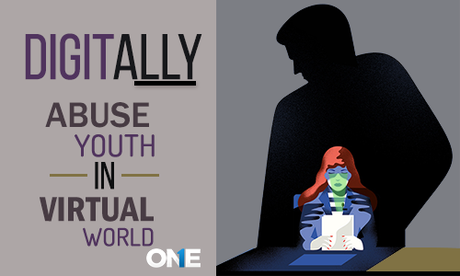 The virtual world has its significance these days. But when it comes to its vulnerabilities, digitally abuse youth is on the rise. Therefore, the issues need to address and parents should take an in-depth look at bullying and cyberbullying, sexual abuse and discrimination in the digital age. Today, we are going to discuss to quantify that how kids, tweens and teens are experiencing, troubled and respond to the problems in terms of bullying online, online dating abuse and well as online slurs. The world’s best parental control app has tracked all the trending data over the years on the digitally abuse youth and further providing services to the parents to protect kids and teens from the dangers of the virtual world. Let’s take a look at the incidents that have been taken place with the youth digitally.
The virtual world has its significance these days. But when it comes to its vulnerabilities, digitally abuse youth is on the rise. Therefore, the issues need to address and parents should take an in-depth look at bullying and cyberbullying, sexual abuse and discrimination in the digital age. Today, we are going to discuss to quantify that how kids, tweens and teens are experiencing, troubled and respond to the problems in terms of bullying online, online dating abuse and well as online slurs. The world’s best parental control app has tracked all the trending data over the years on the digitally abuse youth and further providing services to the parents to protect kids and teens from the dangers of the virtual world. Let’s take a look at the incidents that have been taken place with the youth digitally.
Digitally Abuse Youth Collective Incidents
Almost three quarter of youth believes in digital abuse am alarming issue and it is on the rise since 2009.
MTV –AP Digital abuse survey says
- The study says, almost 76% of youngsters between the age of 14 -24 years old says digital abuse is dangerous issue
- Almost 56% of the youngsters say they have experienced digital abuse from social media and digital media using cellphones and computers with cyberspace connectivity
- Digital harassment is common and 26% people write things about people that are not true.
- 24% of people online write things that are mean and 24% forward it on instant messaging or messages and 20% intends to stay private
- Young adults dramatically are more likely to experience digital abuse 59% and 50% of kids and teens experience online abuse
- 3 out of 10 teens admits to be humiliated or harassed online and 24% of adults between the age of 18 -24
- Young adult women are more likely apt to see digital abuse (80%) compared to the men (70%).
- 14-17 years old more apt to call it an issue 80% compare to their older peers 73%
Online abuse does not belong to strangers –victims mostly knows abusers
It is strange things that most of the victims that have been experienced the digital abuse are more likely knows the abusers. The experts have tested 13 out of 16 cases where victims strongly believe that they know who have abused them online.
Digitally Abuse Youth & Sexting
Youth knows that sexting is curse, but still 1 out of 3 doing sexting and they do as result of pressure.
Technology over the years has made young kids and teens tending them to navigate sexuality with the use of mobile phones, gadgets and computer devices. 71% of youngsters say this is a serious issue for people, of their age. But there is exception among the teens and young adults between the ages of 14-24 that consequences won’t come in their way due to sexting.
Yong teens and tweens surprisingly are more likely to receive content based on self-obscenity in terms of photos, videos and sexually charged text messages.
- Almost 15% of the youngsters share naked photos, videos of themselves and 33% have received it from someone along with sexual words
- However, 21% of the youngsters have received nude photos and half of them sent being pressurized by a stalkers or sexual predators being trapped online
- Sending sneaky text messages codes and sexting (19%) are more in young adults compared to 7% in teens
- 10% youngsters get involved in sexting with the people they known online by using social media or cellular network of cellphone.
41% of teens in a relationship with someone experience digital dating abuse and one fourth of the teens feeling pressure to continuously check in digital devices, because of partner.
3 out of 10 teens have admitted that their partner online used of checking their online appearances via cell phone and ask them what you are doing or where were you. Moreover, few of the partners have questioned what they are doing, and 27% explore the text messages of the partner without permission. 24% of teens in a relationship have to respond to their boyfriends or girlfriends in pressure on IM’s social media, emails, cell phone call and on text messages.
However, when it comes to the social media platforms 15% of the current partner has been ordered to their girlfriends to remove their x boyfriend from friend list or follow list. Moreover, 13% of teens in a relationship with someone have asked for the password keystrokes, messenger keystrokes, emails keystrokes, and others. 5% of the teens have faced humiliation and embarrassment online because of their boyfriend that share their personal or private information and even spread rumors as well.
Digital Discrimination & Digitally Abuse Youth
Online slurs are pretty common and young kids and teens have to deal with slut shaming or slut, gay, fag, retard, and plenty of others alike
According to MTV & the Associated Press-NORC Center for Public Affairs usually 71% cyber bullies and predator’s online use slurs via text messages on cell phone and via social media. One out of two people uses slurs in terms of discriminatory language on social media platforms. Slur usually being used against people who are overweight, teens with black skin or have sexual relations and with the immigrants as well. Slurs are based on cast, color, creed, and physical appearance and to some extents habits. So, slurs quite heavily take part in demoralizing youngsters online. Therefore, digitally abuse youth is on the rise due to the rise in the rise of the technology. Moreover, young kids and teens are obsessed with social media and they have to face online dangers in terms of digital abusiveness.

Youth is quite concerned about digital discrimination and parents to the fullest. Digital discrimination may lead teens to suicide in terms of cyberbullying.
Though 76% of youngsters are quite concerned over digitally abuse youth in terms of digital discrimination and still they have conflicting feelings on the virtual world. Moreover, 51% of the people that use slurs say they are just kidding with their friends or I don’t mean it at all. However, bullies online, peoples after broke up in a relationship use slurs to abuse their former girlfriends.
Digitally Abuse Youth: Impacts & The Rise Factors
Digitally Abuse Youth Cannot be Ignored
Almost 53% of those that have faced online abuse say it was quite devastating for them. Young kids and teens these days are very careful and fond of digital identity and they don’t want to be digitally abuse at all. Neither the teens nor children want to be humiliated online and nor the parents want their children to get humiliation that effects them emotionally, mentally and physically. Most of the teens have shown their concerns over digital abuse with the use of technology such as social media, emails, and phone text messages to spread fake things about them online.
- 56% of the victims say something written or share about them online was very mean
- 45% says it was very disrespectful and humiliated when someone has written or spread something that was not true
- 46% of victim scared when anyone threatens to harm them physically written online using social media and other tech –tools
- Electronic sharing seriously hurt the victims emotionally: 46% really got scared when someone says he/she is going to share something is quite personal in terms of their sexuality
Digitally Abuse Youth & Their Health
According to the study, those who are the victims of digital abuse cause psychological issues 5 -14% more opt for suicide and teens are more likely to do that. The young kids and teens that have got involved in sexting at the end of the day have to deal with the health treatment. 6% really become emotional when someone unveils their sexting to someone else.
Other Risky Behaviors are Associated with Digital Abuse
Digitally abuse youth usually get involved in sexting, drug abuse, sexual activities, blind dating, and plenty of such activities that really harm them from all ends. 21% digitally abuse youth also get involved in the bad habit of smoking and 35% of teens being abused online get used to of attending parties and uncommitted sexual activities.
Digitally Abuse Youth Lack with Grades
12% of Students that used of sexting are more likely lack with grades at school and at the end of the day got to drop out of school. The element of bullying beyond the school gates or online by the fellows often hit them mentally.
Digital abuse youth is from all colors, creed & cast. So the digital abuse is one of the biggest issue these days that really have scared parents.
How Parents can Protect Teens to be Digital Abuse Youth?
There is the number of techniques that could stand out as particularly helpful, each of it based on limiting the access of children online. There are following tips for the parents and as well as for the teens and kids who get used to staying online on their devices connected to the internet. There are following methods that parents and children should adopt respectively
Tips For Digital Abuse Victims
- Teens in a relationship should change their passwords if they are in a relationship and have shared passwords
- Don’t respond to the content that is abuse and don’t read the received sentences based on slurs, abuse language
- Teens should also change their email address of IM’s accounts and others
- Hide your profile or set privacy or make it custom
- Once bullied online or threatening contact with the law enforcement or discuss with parents
Tips For Digital Parents
- Parents should teach their children about the consequences of sexting
- Guide your children not to get along with the strangers online
- Make some ground roles to set limits on screen time on teens devices
- Be friendly with kids and teens to discuss anything including if they have abused online
Parents should set parental control on kids and teens cell phones, gadgets and computer devices with parental control app.
Parental Control Plus Points
- Track your teen’s sneaky messages with text messages spy
- Remotely control internet access including social media and text messages with use of cellphone spy app
- Get the logs of social media apps in terms of text messages, text conversations, shared multimedia and others
- Remotely record screen activities in real –time with secret screen recording app
- Record phone calls with secret call recorder and get to know to whom kids and teens are talking
Conclusion:
TheOneSpy Parental control software over the years is the voice of a campaign “Digitally abuse youth” in creating awareness among the parents that they should look after their kids and teens activities online. It further provides services to the parents to combat against the digital abuse of their children.
